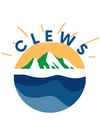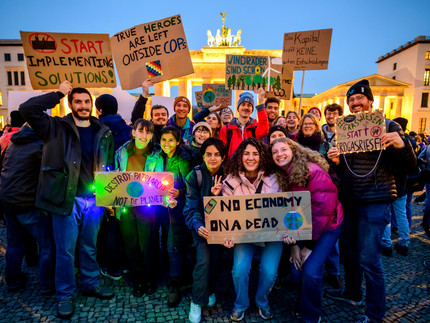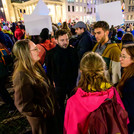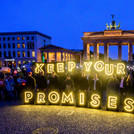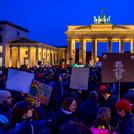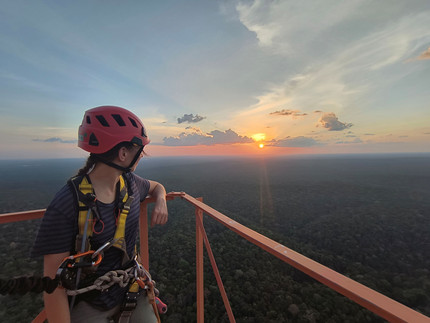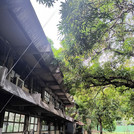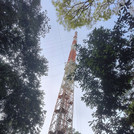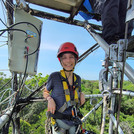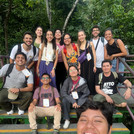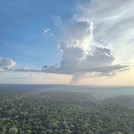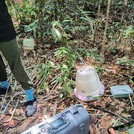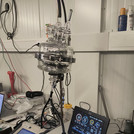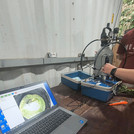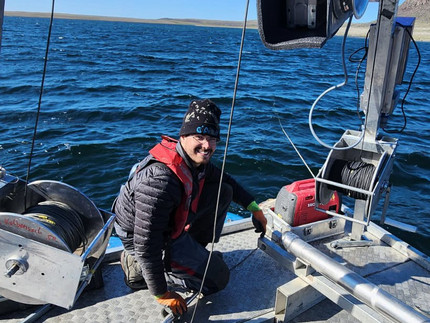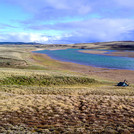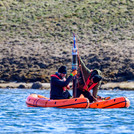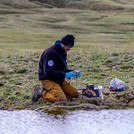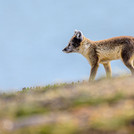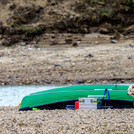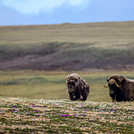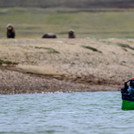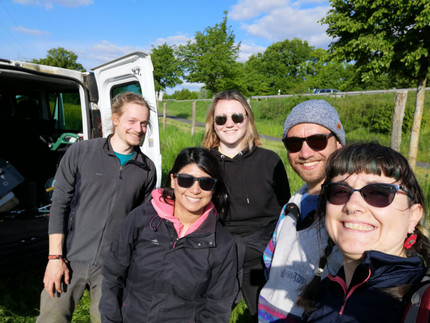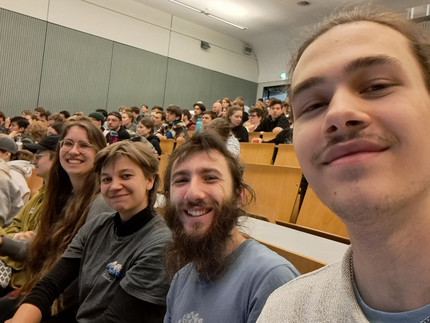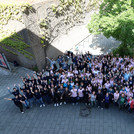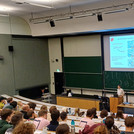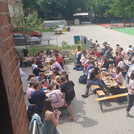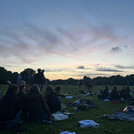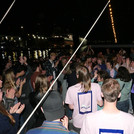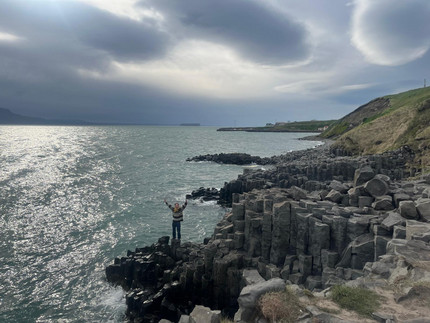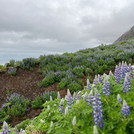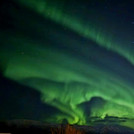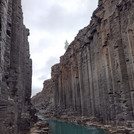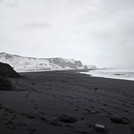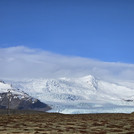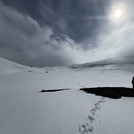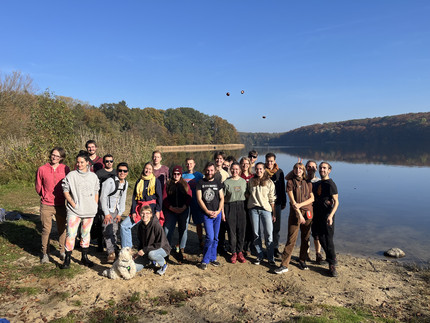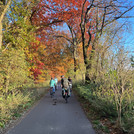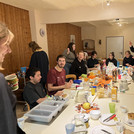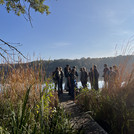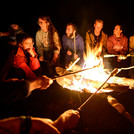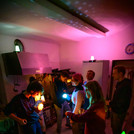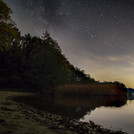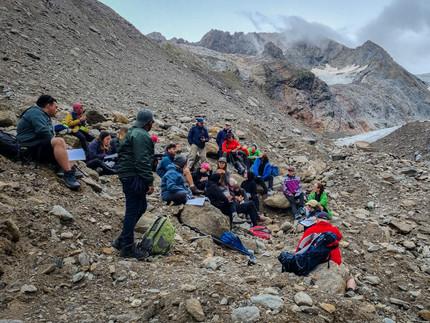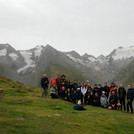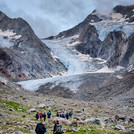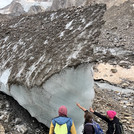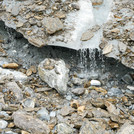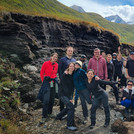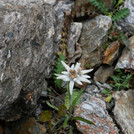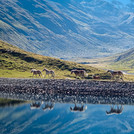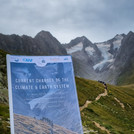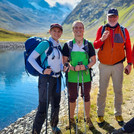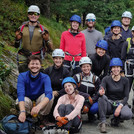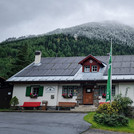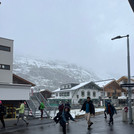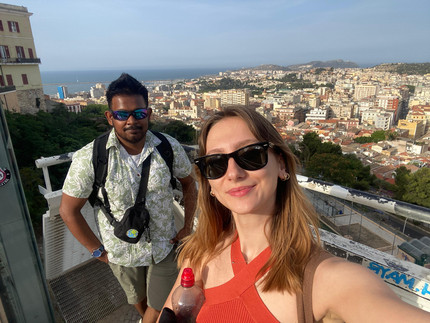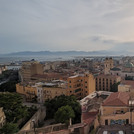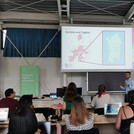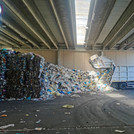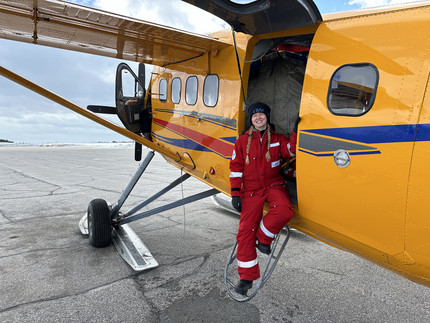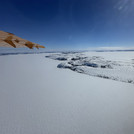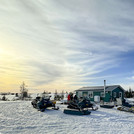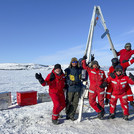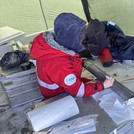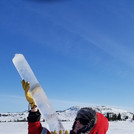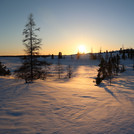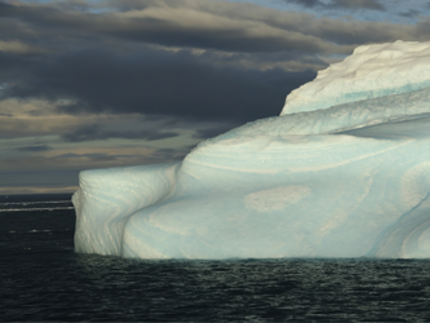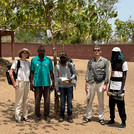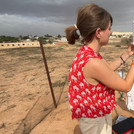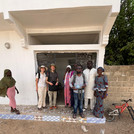CLEWS experiences - much more than studying
CLEWS is much more than just studying in lecture halls and sitting in libraries. Together with our partners, CLEWS offers exciting opportunities to get involved in cutting-edge projects in the field of environmental and climate science, to find a job as a student assistant and gain your first work experience, or to do an interesting internship. We also offer the opportunity to study abroad for a term or two, taking advantage of our diverse ERASMUS partnerships across Europe. And all students will take part in the compulsory CLEWS excursion to the Alps. Here are just a few examples of the exciting experiences students have had while studying CLEWS...
CLEWS at Global Climate Strike
As the UN Climate Change Conference, COP30, unfolded in Belém do Pará, Brazil, CLEWS students joined Fridays For Future’s demonstrations in Potsdam and Berlin on Friday, November 14th, 2025 (article in "ZEIT"). The preparation began days before, with the making of signs bearing messages that expressed nonconformity with COP30, a slow phase-out of fossil fuels, and the lack of a genuine commitment to necessary environmental policies. On Friday, with our signs ready at hand, we joined groups of scientists, engaged families, and civil society organizations at Pariser Platz. Protest chants, lights, and a myriad of handcrafted strike paraphernalia enlightened the streets around Berlin’s center. We were loud, with the hope that the echoes of our chants made it all the way to Belém. At the end, we heard speeches of climate activists such as Luisa Neubauer and Stefan Rahmstorf.
Our participation in the Global Climate Strike provided a platform to share information with the general public about the latest climate findings and unique topics from different geographical locations. As it was the case where the talk of Professor Stefan Rahmstorf sparked a conversation between climate strikers and students from CLEWS. Some students got the opportunity to answer follow-up questions regarding the climate tipping points and how these will impact natural systems. Additionally, one CLEWS student made a sign relating to the exclusion of indigenous communities from the COP30 conversation and negotiations which sparked a number of conversations across the strikers. This was an opportunity to share about this important topic and educate people interested in the indigenous flag and their importance in the fight for climate justice and a climate future. The voluntary participation of students in this event provided a space to practice climate communication skills and to shed light on scientific and geographically diverse topics, helping educate the wider community.
Moreover, our participation provided the opportunity to experience the impact of individual actions that drive a behavioral cascade, developing leadership impact skills. According to a Forbes article, behavioral cascade is how individual actions trigger chain reactions in groups, shaping collective behavior and it helps explain why small actions matter disproportionately. Our participation as a group of students started with a passionate student sharing information about the climate strike, a few others showing interest, a few others collecting resources to develop the signs, and a few others planning the logistics; the result was that we joined as a collective and led science outside of the classroom and into the real world. In a topic as crucial yet complex as climate change, this is what is needed: behavior that inspires action and cascade impact, and leaders that help drive those actions and the implementations of plans.
Science should not just take the passive role of describing the planetary crisis. Scientists should also be actively engaged in demanding and assisting in the implementation of real solutions. Research must not be done with the sole purpose of filling up the virtual repositories of faceless journals. Research must contribute to a transformation into a fairer, environmentally sustainable, and enjoyable society. Science, too, must have a seat in the political conversations. As scientists, we have a choice to make: we can ignore this under a false pretension of objectivity, or we can embrace this fact, go out into the streets, and make our voices be heard because we believe another world is possible.
Text written by Bianca Pinto and Samuel Jaramillo
Amazon Tall Tower (ATTO) Summer School - Caterina Vanelli
In September 2025, I had the unique opportunity to participate in the Amazon Tall Tower Experiment (ATTO) Summer School on tropical forests under global change, organized by the Max Planck Institute for Biogeochemistry in Jena. A group of 16 international students spent 10 days with scientists, of which three days were at the National Institute of Amazonian Research (INPA) in Manaus, Brazil, and seven at the field station.
During the first days, we attended talks by multiple renowned scientists on the state of the art of Amazonian research, including forest paleoecology, biodiversity, and current drivers of change such as droughts and their impacts on forest resilience. We delved into the methodologies employed in the ATTO project, modelling approaches and also complex field measurements of gas concentrations, fluxes, and composition, including greenhouse gases, volatile organic compounds, and aerosols.
Then, we left the city by bus, and after four hours on asphalt and mud roads, we took a boat for a couple of hours. The black river, loaded with organic material, flowed next to us, and we were lucky to see an Amazonian pink dolphin and colorful macaws, before being greeted by a tropical thunderstorm as a refreshing welcome in the equatorial heat. At the field station, we visited the container labs and field measurement sites. It was very interesting to connect forest functioning at different scales with observation techniques, and to examine drivers such as soil type and water access.
Climbing up the 321-meter-tall tower, you could see and feel the changes in microclimate at the different canopy levels. Right at the very warm and humid top of the canopy, the diversity of tree species and traits become even more visible.
I chose to participate in the modelling group, where I developed my idea of mapping the areas managed by Indigenous Peoples that fall within the time-changing tall tower wind footprint. Depending on the wind direction, the tower receives signals from different areas of Amazonia, and by combining these signals with modelling approaches, it is possible to estimate whether those areas act as a carbon sink or a carbon source.
I feel incredibly fortunate to have visited the ATTO project, witnessing the passion for knowledge that drew people there and listening to the long and short stories, told in English, Portuguese, and sometimes German and Spanish. Many times, trees, animals, and fungi were the pop stars of these stories, in a way that can only happen in Amazonia, with this wonderful mix of science and cultures deeply intertwined with the forests. I came back knowing much more about the drivers and dynamics of tropical forests, their modelling and measurement techniques, and with beautiful connections and unforgettable memories shared with other young scientists.
Text written by Caterina Vanelli
Expedition to the Canadian Arctic - Stephan Sprinz
I was fortunate to have the opportunity to participate in an expedition with the "Polar Terrestrial Environmental Systems" group of the Alfred Wegener Institute (AWI) to the Canadian Arctic this summer.
The expedition aimed to evaluate changes in the biodiversity of the Arctic tundra since the last glacial maximum. Our methods included collecting lake sediment cores for ancient DNA analysis, as well as sampling environmental DNA and pollen from water and air. We also used multispectral drone imaging and conducted vegetation surveys.
Our small team started fieldwork in Sachs Harbour, a small Inuvialuit (local group of Inuit) community on Banks Island. We worked there for a week and then a small plane dropped us off in Aulavik National Park. There, we travelled with canoes on the world's most northerly navigable river, the Thomsen River, while collecting samples. Along the way, we enjoyed the solitude of the Arctic wilderness and the amazing tundra landscape. We also observed many animals, such as wolves, snowy owls, and muskoxen. However, we also had to brave swarms of mosquitoes, stormy gusts, and biting cold. Although I thoroughly enjoyed the adventure, I was glad the plane picked us up after two weeks and took us to Ulukhaktok on Victoria Island for the final part of the expedition. There, we worked on a drilling platform to collect long sediment cores on a lake close to the hamlet. After six weeks of expedition, we then finally headed home.
Overall, I am very grateful to have had the opportunity to join this expedition. Working in this remote region, experiencing the Arctic nature, and getting to know the Inuvialuit communities were all great experiences. I learned a lot and enjoyed working as part of the great team!
Text written by Stephan Sprinz
CLEWS teacher experience - Katya Dimitrova Petrova
Teaching at CLEWS was one of the highlights of my time at the University of Potsdam. I got to meet a lot of motivated young people with big dreams and their struggles reminded me of my time as a student. Discussing and questioning science in the classroom was an activity which I loved and motivated me even in the depths of vitamin D deprived winters. Besides, I also met hardworking teaching professionals at different stages of their career, diverse visions on science and what university teaching means. Working and exchanging with the Teachers team of CLEWS has been a different dimension of learning altogether and I am thankful for the opportunity to be part of that team.
In these 3 years I have seen the CLEWS program evolve and like to believe that I had something to do with it, even if only a bit. I am extremely grateful for the opportunity to form part of the CLEWS family and wish CLEWS continued success and new adventures, quantitatively measured by the CLEWS stickers on random places around the globe :)
Text written by Katya Dimitrova Petrova
Student Meteorological Conference in Hamburg
In May 2025, CLEWS was part of StuMeTa (Student Meteorological Conference) for the first time. This yearly event connects all meteorology-related study programs from Germany, Austria, and Switzerland. Each year, a different city hosts StuMeTa - this year, it took place in the beautiful city of Hamburg.
Founded in 1988, StuMeTa has a long tradition. The event usually takes place from Wednesday to Sunday over "Christi Himmelfahrt", which is a public holiday in Germany. The first and the last day are mostly for arrival and departure. From Thursday through Saturday, you get loads of thrilling talks from scientists working in the hosting city. Therefore, we got to hear talks from professors at the University of Hamburg and scientists at the Max Planck Institute for Meteorology and the German Climate Computing Center (DKRZ). In addition, there are many interesting workshops and excursions offered, from which you can choose. These can, but do not necessarily need to, be meteorology-related. Personally, I did a workshop on Energy Balance Modelling and had an excursion to the NDR (Broadcasting service for northern Germany). If you want to present your thesis or recent study, there is also a poster session on Friday.
Since StuMeTa is not only a conference but a connection event, all kinds of activities are planned. There is always a bar tour on Thursday, BBQ and games in a park on Friday, and a pub quiz on Saturday. This year, the big highlight was a 4h long ride on a party boat across the Hamburg harbor on Saturday to finish off the event. The organization is always 100% by students of the hosting city and was flawless, just like every year. The days are packed with activities, but everything went smoothly. (Vegan) Dinner and lunch are usually organized, and the sleeping situation is solved by having a big sleepover in a gym of a nearby school. StuMeTa is not only always a big learning, but also great to connect with other students and potentially make new friends.
Text written by Benjamin Felger
Erasmus semester in Reykjavik, Iceland - Milan Flügel
During my Masters in CLEWS, I studied abroad for one semester. I was in Reykjavik, Iceland from January until June. When I arrived, it was dark with only five hours of sunlight per day. It was snowy, very windy and cold. While the weather stayed around 0°C, there was more sun every day (in June there are 21 hours of sunlight and three hours of dawn). I had a great flat with four other Erasmus students and three cats. We cooked and baked a lot together and went out in the nature almost every weekend. The international community was great. The university organized lots of get-togethers and because Reykjavik is such a small city, you met people most of the time you went out. As it is so windy and cold, you spend a lot of time inside, reading. So, it is preferable that you like to spend time with yourself and like having a slow life. If the weather is good, everyone goes outside. We went hiking a lot, as the nature is beautiful. You have lots of Fjords and mountains, glaciers, and Ocean next to each other. While hiking you can be alone, as there is mostly no one around. I was very happy with my study abroad and would recommend it, if you like beautiful nature.
Text written by Milan Flügel
CLEWS Ersti-Weekend in Brandenburg
In October 2024, the FSR organised a wonderful weekend for the first-semester students in the idyllic town of Heinersdorf, Brandenburg. We got there by train, bikes and bus and stayed in a cosy group house where the 25 of us enjoyed the large garden and nearby lake. The lake was perfect for a hike in the beautiful golden autumn weather and the spacious garden was the ideal setting for a bonfire with “Stockbrot” and s’mores (that stuff people make with cookies, chocolate and marshmallows), as well as outdoor games like flunky ball and ninja.
We had a lovely and lively cooking team that provided us with delicious vegan food and made sure we were well fed. The FSR also organised interesting and inspiring workshops: we talked about awareness of inequalities at the university and worked on improvements on this subject - from this the idea for a climate grief circle arose. We also learned an important German survival skill: How to open a beer bottle with very limited tools, from beer crates to paper and even just a string ;)
Between the scheduled events, we had time for challenging climate-related board games and a fun photo competition with categories that tested our creativity!
Overall, we had an amazing weekend with lots of mandatory fun, fantastic weather and great people! It was very sad to leave on Sunday, but we left with new friendships which makes everyone’s start in Potsdam a bit easier and the studies more fun.
Text written by Emma Gerlach and Jay Glinski
CLEWS Excursion to the Ötztal Alps
As now the 3rd generation of CLEWS students, we finally had our mandatory excursion to the Ötztal Alps in Austria to look at evidences of current climate and earth system changes in the field. Although the weather forecast was quite shaky, we ended up spending some nice days outside, looking at the geology of the Alps, glaciers, peat, evidence of geomorphological processes and permafrost, as well as the alpine flora and fauna. In addition to the (undoubtedly eye-opening) presentations by students and professors, we had the opportunity to talk to local experts, which was very insightful and gave us much to think about tourism and the region’s dependence on it.
Besides this, we had a lot of fun during the hikes including climbing a via ferrata. Our cozy hut was the perfect place for cooking, dancing, and playing a lot of games when it was not so cozy outside. However, on the last day, the weather even allowed us to have our first snowball fight of the season, which was a great end to an exciting week.
Text written by Sophia Künzig, 2024
Summer School in Italy - Nirmal Kularathne & Selin Hayrat
In June 2024, we had the privilege of participating in the summer school "Circular Bioeconomy for Sustainable Waste Management and Resource Recovery" at the University of Cagliari, Italy. This event was organized by the EDUC (European Digital UniverCity Alliance), a collaborative network of eight universities across Europe. Throughout the summer school, we had the opportunity to collaborate with students from diverse backgrounds in climate science and sustainability, engaging in knowledge-sharing activities and group projects.
The week was filled with insightful lectures on a variety of topics, including circular economy, eco-design, material recycling, and waste management. The organizers at the University of Cagliari also arranged several enriching field activities, such as tours of their laboratories with introductions to ongoing research, a guided city tour of the beautiful Cagliari, and, as the highlight of the program, a visit to a plastic sorting plant of the Consorzio Industriale di Oristano. The summer school concluded with a group project focused on innovative solutions to reduce coffee waste, which effectively integrated all the knowledge we had gained.
This experience not only deepened our understanding of sustainability from multiple perspectives but also allowed us to explore the picturesque city of Cagliari, with its stunning beaches and delicious Italian cuisine. Above all, we made new friends, created lifelong memories and received exceptional support from the organizers, Fabiano and Gianluigi, whose kindness and dedication truly made this week unforgettable.
Text written by Nirmal Kularathne
Expedition Wiyashakimi - Eva Lüdke
In the spring of 2024, I got the amazing chance of taking part in a research expedition organized by the Alfred Wegener Institute for Polar and Marine Science (AWI) in collaboration with the Centre d’Études Nordiques (CEN) at Université de Laval as a student assistant.
The mission of the expedition was to collect environmental samples at Wiyâshâkimî, a crater lake in Québec, Canada, to gain insights into the local climatic and environmental conditions from the end of the last Ice Age to the present day. With a team of six people from AWI and CEN, we spent almost four weeks in Canada, traveling to the site, preparing equipment and working in the field.
During our time of working at the frozen lake – where the ice was nearly 1 meter thick - we lived at a remote research station and had multiple tasks. These included collecting water and snow samples, drilling ice cores, and, most notably, retrieving sediment cores from water depths of up to 110 m using specialized coring equipment.
I am very grateful for the chance to experience fieldwork in such a unique setting. I learned a lot about the challenges of planning and completing an expedition, such as dealing with logistical issues, enduring cold temperatures, and living without running water. In the end, the experience allowed me to create incredible memories that I will carry with me forever.
Text written by Eva Lüdke
CLEWS students publish article in ‘Nature Communication’
Current climate policies imply a high risk for tipping of critical Earth system elements, even if temperatures return to below 1.5 °C of global warming after a period of overshoot. A new study published in Nature Communications indicates that this risk can be minimised if the warming is swiftly reversed. That is why reducing emissions in the current decade is crucial for the stability of the Earth systems functions, researchers from the Potsdam Institute for Climate Impact Research (PIK), the International Institute for Applied Systems Analysis (IIASA) and other institutes write. They analysed the tipping risks for four interconnected core climate tipping elements: the Greenland Ice Sheet, the West Antarctic Ice Sheet, the Atlantic Meridional Overturning Circulation (AMOC), and the Amazon Rainforest. More...
Field trip to Senegal - Ludovica Gatti
During my mandatory internship in the second semester, I had the opportunity to travel to Senegal for two weeks with the "Climate Physics" research group at the University of Potsdam. I also work as a student assistant there. The field trip was part of the DakE project, led by Prof. Dr. Jan Haerter, in cooperation with the Leibniz Centre for Marine Tropical Research in Bremen, the Université Cheikh Anta Diop (UCAD) in Dakar and the Ecole Nationale Supérieure d'Agriculture (ENSA) in Thies. The aim of the project is to study and understand extreme climatic events in the region east of Dakar in Senegal.
Our fieldwork in June-July 2024 focused on installing a network of small air temperature, pressure, and humidity sensors throughout the study area. We installed most of the sensors in public schools, which allowed us to engage directly with local people and experience Senegalese culture firsthand. Reaching some of the more remote installation sites took us far from the main tourist towns, and into the most traditional and authentic parts of the region. This really allowed us to form a deeper connection with the Senegalese people and their traditional way of life. It was one of the highlights of the trip for me, as it made the experience truly unique and invaluable.
This field trip allowed me to gain experience of how a field campaign is organised, from the planning stage to the practical implementation of the fieldwork. Furthermore, working in close contact with the Senegalese partners was a very enriching experience and gave me the opportunity to see how science and research are carried out in a very different cultural and economic context.
Text written by CLEWS student Ludovica Gatti
Exchange at the northernmost University Center in Svalbard - Tessa Möller
In April 2023, I went to Svalbard for six weeks to take part in a block course at the University Centre in Svalbard (UNIS) on "Marine Cryosphere and its Cenozoic History". This stay abroad not only gave me the opportunity to acquire theoretical knowledge about the cryosphere, but also allowed me to apply what I had learnt in the field by taking measurements of sea ice and glaciers during the fieldwork.
A stay on Svalbard allows for an intensive immersion into the adventurous and remote polar life. I also had the opportunity to encounter polar bears, seals, walruses, puffins, Arctic foxes and whales at a safe distance. During my stay in Svalbard, I lived in a student residence with other enthusiastic Arctic students and was also able to make some friends.
My highlights included the fieldwork and all the hikes and outdoor adventures. The experience of the omnipotence of the glaciers was particularly impressive. It was also a special experience to be on site during the polar day and therefore not experience night for a longer period of time. I was also able to experience the "Northernmost" sauna and then bathe in the fjord - an unforgettable experience. As part of the course, I also learnt how to drive a snowmobile and had to take part in a safety course on site, which also included obtaining a firearms licence to protect me from polar bears in an emergency. However, the main focus was on avoiding confrontations with the polar bears and protecting them from humans.
Text written by Tessa Möller
Erasmus exchange semester at the Istanbul Teknik Üniversitesi (ITÜ) - Johannes Wilk
In the winter term 2022/23 I had the opportunity to spend a semester abroad at the Istanbul Teknik Üniversitesi ITÜ. I wanted to take part in the Erasmus exchange programme because it gives students the opportunity to immerse themselves in another culture, fostering intercultural understanding and personal growth. Beyond the academic benefits, the programme encourages students to navigate new environments, make international connections and develop valuable life skills that extend far beyond the classroom. The organisation and approval of the scholarship went smoothly and without any problems.
Thus, in September, I started my journey to the fascinating scenery of Istanbul, a metropolis that impresses not only with its sheer size, but also with the division of two continents by the Bosphorus, its rich historical past, the exciting coexistence of different cultures and the exciting urban landscapes. Every day was a new chapter of discovery, whether in the colourful bazaars, the winding alleyways of the European or Asian old town, or the constant chaos of a large Turkish city.
My favorite experiences included connecting with locals over tea in charming cafes and exploring the city with friends from all over Europe. Additionally, being a part of the university's Handball Team was a lot of fun. The classes at the university were very interesting and enriched my knowledge considerably. I was able to transfer all my credits to the CLEWS Masters programme which made it a fruitful stay abroad. In addition, I started learning Turkish so that I could communicate better and connect with the local culture. I would recommend it to everyone because it opens so many doors and gives respect to the local community. The language course was even sponsored by the University of Potsdam.
At the end of the semester, I had the opportunity to explore the country further. I visited impressive ancient sites such as Antalya, Ephesus and Pamukkale. I also discovered the east of the country with the fascinating cities of Mardin, Van and Dogubayazit. These experiences broadened my horizons and will stay with me for a long time to come.
Text written by Johannes Wilk
Echo-sounding traineeship on AWI research vessel Polarstern - Aparna Prasannakumar & Paula Allertseder
We had an amazing opportunity to take part in a 2-week traineeship offered by the Alfred Wegner Institute for Polar and Marine Research on Echo-sounding techniques aboard the famous research vessel, Polarstern! Our transit started from Bremerhaven on the 23rd of October and reached Gran Canaria, Canary Islands on the 4th of November 2023. With Echo-sounding techniques, we can map the sea floor and get geologic information by measuring sound waves reflected from the sea floor to the ship. The traineeship had a very hands-on approach where the students had the responsibility to make sure the echo-sounding systems were always operating and collecting data at all times. For this, each of us had 4-hour shifts, along with lectures every day on marine geology, bathymetry and parasound systems. At the end of the training, we gave presentations on the geology of the seabed we passed through by visualizing and interpreting the data from the echo-sounding that we collected during the transit. Overall, the traineeship immensely increased our interest in marine geology and equipped us with tools that we might need in our academic journey forward.
Text written by Aparna Prasannakumar & Paula Allertseder
CLEWS mandatory exciting field trip to the Alps
In summer 2022 was the first field excursion of the new Master’s program CLimate, Earth, Water and Sustainability was conducted in the unique environment of the upper Ötztal in southwest Austria. 26 Students from nine different countries were taking part in this eight-day intense excursion early September. The goal of the field trip was to sensibilize the students to the ongoing impacts of climate change - directly in the field. Experiencing the impacts of climate change in the real world makes a difference. By this, the students see the pressing changes in what they learn to understand and analyze during the CLEWS master program.
A traditional beautiful hut with room for the students in the small village of Zwieselstein was taken as a base camp to perform day trips and tours to explore the surroundings. Every excursion day there was a new overarching theme defining the structure of the procedure and topics. Starting with the geological genesis of the alpine mountains, moving on to the specific abiotic and biotic formations present in the Alps, and ending with the anthropogenic usage and impacts in the alpine region. Every student was an expert in one specific topic sharing this knowledge with fellow students by holding a presentation. This gave everybody broad insights into the past and present climate changes processes and impacts in the alpine region.
The most remarkable part of the excursion was the three-day tour to the alpine hut “Vernagthütte” close to the Vernagtgletscher located at over 2.700m in height. A challenging and exhausting hike starting from the small village Vent to the hut brought the whole group to its limits. But the task was mastered and the beautiful views in the upper mountains could be enjoyed with some taking a bath in the glacier water pool. An astonishing sunset and starry sky enhanced the enjoyable moments of an overall exhausting and demanding day.
The next day then was taken to explore the glacial areas of the famous Vernagtgletscher. With the geological expert, Prof. Bernhard Dieckmann from AWI special insights and knowledge have been shared. Reaching the glacier the group explores the glacial processes first-hand. Many of the participants have never seen a glacier before, hence it was a unique experience for most of the group members. After one more night in the hut, the whole group hiked down to the village in Vent to get all the things together and travel home to Potsdam. The whole excursion was an important and educational trip to the Alps in which the students could gain broad and hands-on knowledge about the actual impacts of climate change.
Text written by CLEWS student Johannes Wilk

